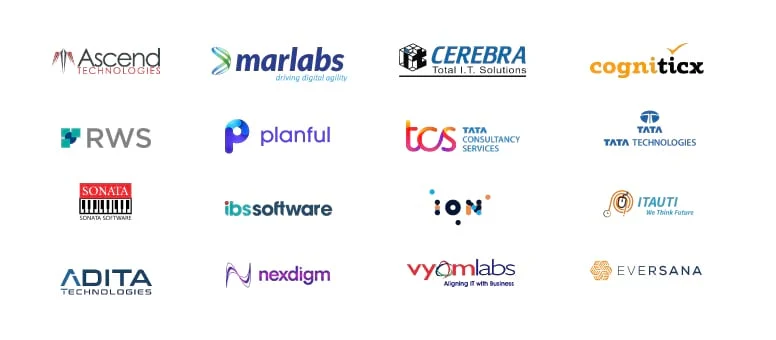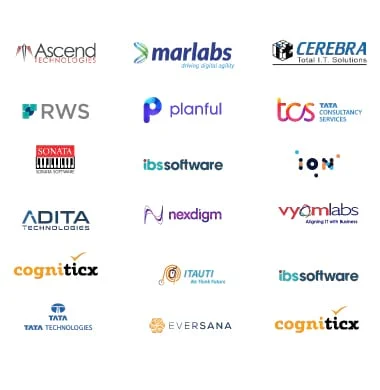30+ Hrs
Hands On Training
Lifetime Access
Updated Content
Customizable
Learning Paths
Industry Expert
Mentors
Projects
Advanced Interactive

Hands On Training
Updated Content
Learning Paths
Mentors
Advanced Interactive
PMP® is a globally recognised certification that verifies a person's ability to lead, direct, and manage projects in any field. The Project Management Institute (PMI®, USA) administers it. Individuals who achieve the PMP certification improve their marketability to employers, stand out from the crowd, and maximize their earning potential. The PMBOK Guide (5th edition), which is a guide to the project management body of knowledge, provides the basis for the training and certification.
HKR trainings PMPtraining in Canada is an excellent place to start for professionals who want to learn about and become certified in PMP. In the current PMBOK® Guide – Sixth Edition of the PMP® Certification course, there are numerous modifications to the PMP® course subjects. If you're an ambitious project manager or looking for PMP® online training certification in project management, the PMP® course in Canada is the best way to celebrate project management's achievement in your professional life. New trends, developing practices, customizing concerns, and fundamental competencies required of a Project Management professional are all covered in the training phase. Enrolling for the PMP Certification Training in Canada at HKR trainings will provide you with all of the necessary skills and practises required to become an expert professional.
To apply for the PMP Training in Canada, you need to either:
The goal is for everyone to have a thorough understanding of PMP. As a result, we start from the beginning and keep you up to date on everything. Please refer to the modules that will be taught in the PMP course to learn more about our PMP training in Canada:
1.1 What is PMP?
1.2 Prerequisites for the PMP Exam
1.3 PMP Exam Syllabus
1.4 Structure of the PMP Exam
2.1 Project Definition
2.2 Understanding Project Management
2.3 Understanding Operations Management
2.4 Understanding Program Management
2.5 Understanding Portfolio Management
2.6 Project Management Office (PMO)
2.7 Portfolio, Program, Project – A High-Level View
2.8 Mission, Vision, Goal, Strategy, Objective and Tactic
2.9 Organizational Strategy
2.10 Project’s Link with Organizational Strategy
2.11 Strategic Alignment of Projects
2.12 Business Benefits
2.13 Benefits Realization
2.14 Business Value
2.15 Constraints
2.16 Organizational Systems
2.17 Enterprise Environmental Factors
2.18 Organizational Process Assets
2.19 Comparing Project Life Cycle and Product Life Cycle
2.20 Project Manager Role
3.1 Overview of the Project Life Cycle
3.2 Comparing Project Life Cycle and Project Management process
3.3 Stakeholders
3.4 Key Stakeholders
3.5 Process Groups and Knowledge Areas
3.6 Inputs/outputs of the 49 Project Management processes
3.7 Organizational influences on Project Management
4.1 Understanding Project Integration Management
4.2 Project team role
4.3 Project sponsor role
4.4 Project selection methods
4.5 Project charter and role of a project manager in charter development
4.6 Recap of continuous improvement lessons
4.7 Project Integration Management Knowledge Area Processes
5.1 Understanding Project Scope Management
5.2 Comparing Product Scope and Project Scope
5.3 Project Scope Management Knowledge Area Processes
6.1 Understanding Project Schedule Management
6.2 Understanding Project Schedule
6.3 Gantt Charts
6.4 Network Diagram
6.5 Estimation
6.6 Schedule Network Analysis Techniques
6.7 PERT, PERT Analysis, Critical Path Method and Schedule Compression
6.8 Project Schedule Management Knowledge Area Processes
7.1 Understanding Project Cost Management
7.2 Distinguishing Cost Estimating and Cost Budgeting
7.3 Key Terminology in Project Cost Management
7.4 Earned Value Technique
7.5 Project Cost Management Knowledge Area Processes
8.1 Understanding Quality
8.2 Understanding Quality Management
8.3 Cost of Quality
8.4 Seven Basic Tools of Quality
8.5 Project Quality Management Knowledge Area Processes
9.1 Understanding Resource Management
9.2 Project Sponsor Roles and Responsibilities
9.3 Comparing Functional Manager and Project Manager
9.4 Conflict Management
9.5 Motivation Theory
9.6 Project Resource Management Knowledge Area Processes
10.1 Understanding Communication
10.2 Communication Methods, Technology, and Channels
10.3 Basic Communication Model
10.4 Key Terminology in Project Communication Management
10.5 Project Communication Management Knowledge Area Processes
11.1 Understanding the Risk
11.2 Project Management Risks
11.3 Calculating Risk and EMV
11.4 Risk Classification
11.5 Decision Tree Analysis
11.6 Risk Reserve and Contingency Reserve
11.7 Key Terminology in Project Risk Management
11.8 Project Risk Management Knowledge Area processes
12.1 Understanding a Contract
12.2 Different Types of Contracts
12.3 Pros and Cons of contract types
12.4 Key Terminology in Project Procurement Management
12.5 Project Procurement Management Knowledge Area Processes
13.1 Who is a Stakeholder?
13.2 Stakeholder Register
13.3 Various Analytical Techniques for Stakeholder Analysis
13.4 Managing stakeholder engagement and relationship
13.5 Key Terminology in Project Stakeholder Management
13.6 Project Stakeholder Management Knowledge Area Processes
14.1 PMI’s Code of Ethics and Professional Conduct
14.2 Vision and purpose of the Code
14.3 To whom does the Code apply?
14.4 Structure of the Code
14.5 Aspirational and Mandatory Conduct
14.6 Responsibility and Ethics Complaints
14.7 Description of Respect, Fairness, and Honesty
In this project, you will be deciding what is the product you want to sell, what channel you will be using to create the campaign .....and decide whether to hire an ad agency for this purpose, etc. Then note down the outcome: whether to generate the revenue or gather the data for future ad campaigns. Then Identify the people involved in this process, and plan what to do when to do. Then review what has worked well. Read more
In this project, we will be creating an Online course right from the beginning i.e., writing the script to recording the video for..... the whole concepts in the curriculum. Here you will first determine the outcome, describe the tasks, identify the people involved in this process, plan and decide the timeline. Then review the course, publish it, promote it and listen to the feedback from the people and make the enhancement. Read more


Once you have completed your PMP Training, we will achieve the following things.They are:
Professionals with Project Management expertise who wish to advance their careers with a globally recognised credential might benefit from PMP certification training. In Canada, the PMP course is best suited for:
HKR trainings will provide you with a certificate of course completion once you have completed the course. This PMP course completion certificate will assist you in landing the ideal job.
We have a team of PMP professionals with between 9 and 10 years of expertise. They would give you PMP training and accompany you through the PMP course.
PMP is one of the world's most popular system, with an ever-increasing demand. As a result, earning a PMP certification might assist you in securing the greatest opportunities with a decent income.
We will give you full support in finding the best firms for you and guiding you through the process. Our real-world examples and actual projects will make it simple for you to find work fast and effortlessly.
PMP Certification will increase your value in the market. So the individual with PMP certification will earn 20% more than the non certified people. So getting a PMP certification is worth it.
PMP refers to Project Management Professional. It is an internationally recognized designation offered by Project Management Institute to the individuals who clears the certification exam.
A PMP certification will expire. Every three years you need to renew the certification. So before the certification expires you can renew it to keep your PMP certification active.
You need to secure 61% to pass the PMP exam.
If you want to retake the PMP exam, you need to pay the reexamination fee. If you are a PMI member, the fee for the PMP Certification is $275, and for the non-members, the fee for the PMP Certification is $375.
Every class is recorded. If you have missed your class, you can learn those concepts from the recorded sessions of the missed class. So, No worries!
Yes! Right from the first day of your PMP training, our trainers make sure that you understand all the concepts and provide you with complete guidance to reach your dream job. And when you complete your course, we will also assist you in your resume preparation which will give you the confidence to clear your interview. Moreover, We are also tied up with some corporate companies. So when they have a requirement, we forward your profiles to them.
At HKR, we provide a free demo session for training seekers so they can check our quality and method of education before they enroll.
Our trainers for PMP training are professionals with more than ten years of work experience. They will deliver you the PMP Training. They have a flair for making learning fun and easy. So you will get the best training.
You can contact our customer care number if your query does not belong to any of the questions we have addressed in this article. We will get back to you as soon as possible.
HKR Trainings assures that the learners get a quality course from our trainers. You (the learners) will have lifetime access to recorded sessions. So in case of any doubts, you can watch these recorded sessions or even can ask your trainers to clarify them. Moreover, you will also be working on a real-time project which will help you understand the concepts more clearly. So there is no question of not being satisfied.
For Assistance Contact:
![]()
![]() +91 9711699759
+91 9711699759
Query